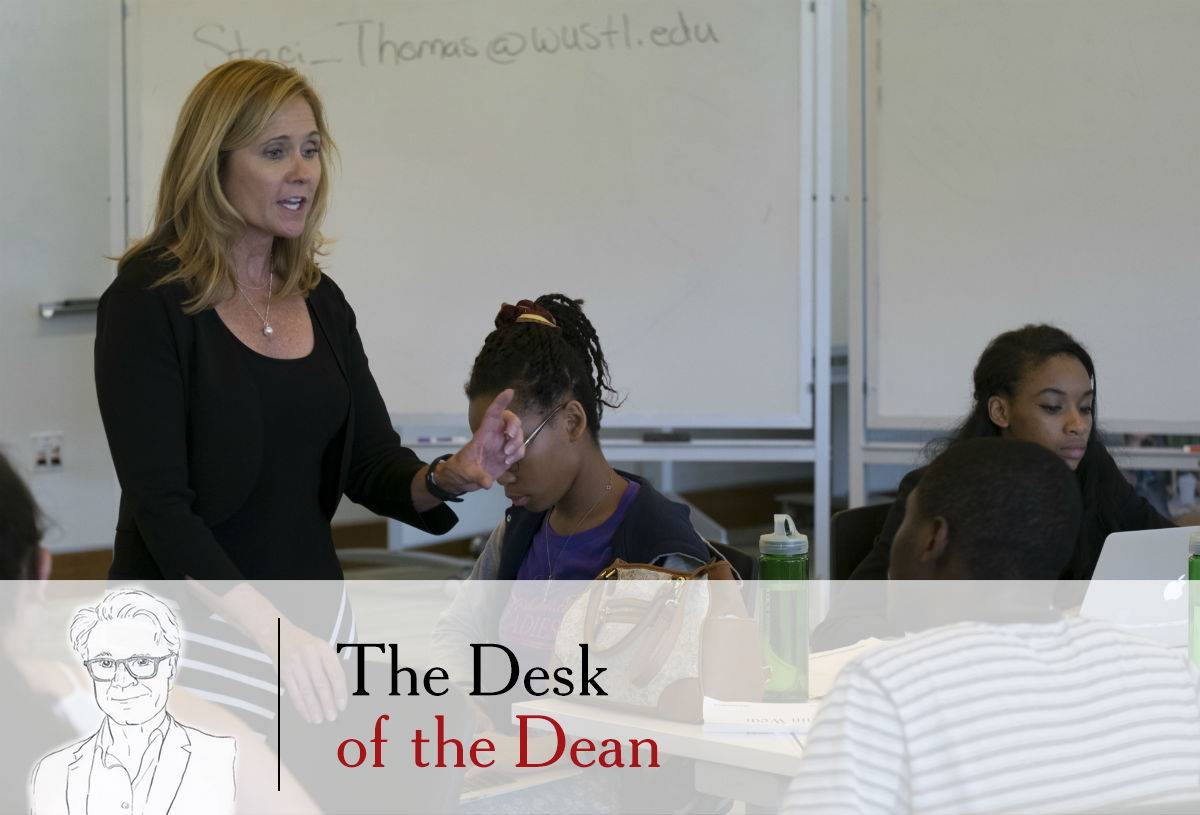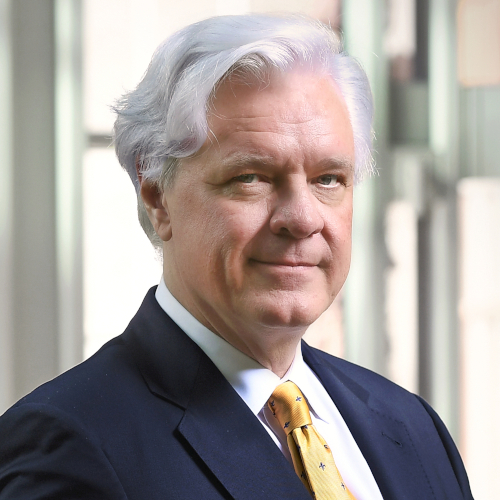Investing in virtual learning for Olin students
- December 5, 2018
- By Mark Taylor
- 4 minute read

We live in a world of change and disruption in all spheres of life. In particular, technology has had a largely positive effect on all aspects of our lives—personal and professional. Education is no exception.
I thought I needed to flip the classroom so the lectures become the homework. Class becomes more like a workshop. We do presentations or create communications plans collaboratively. I can see it. I can hear it. I can offer suggestions to improve.
—Staci Thomas
While the pace of technological innovation appears to be accelerating, innovation itself is not altogether new. Over the centuries we’ve moved from scrolls to codex books and more recently toward digital reading technology such as the Kindle and the iPad, and most classroom instructors have replaced dusty chalkboards with more modern alternatives.
Yet the standard process of knowledge transfer in universities—the lecture—hasn’t changed much in around the last 1,000 years, since the rise of the university in the early European Renaissance. This is beginning to change around the world—and at Olin, in classrooms run by professors such as Andrew Knight and Staci Thomas, who adapted classes that used to rely on classroom lectures and projects that students worked on outside of class.
“I thought I needed to flip the classroom so the lectures become the homework,” said Staci, a lecturer in communication. “Class becomes more like a workshop. We do presentations or create communications plans collaboratively. I can see it. I can hear it. I can offer suggestions to improve.”
Now, basic knowledge transfer happens outside of class, through short video clips, video conferences and other technological tools. It’s important to note however, that this method of knowledge transfer is a complement to rather than a substitute for face-to-face interaction. First, we use behavioural science to fine tune knowledge transfer outside of class, based on known attention spans and the creative use of mental stimuli through technology.
Then we use the face-to-face classroom experience to assimilate that knowledge, taking it in more deeply and fully understanding its implications and uses in a range of contexts and collaborative situations, using real-time case studies, seminars and group discussions.
Creating tools to encourage change
At Olin Business School we are building a custom-made e-learning platform tailored to the school’s needs. Equipped to give instructors and classmates the tools to collaborate from around the world, it will seamlessly integrate course materials, online learning experiences, recorded materials and innovative assessment, in an online environment which is uniquely Olin.
Two months ago, three new colleagues joined the Olin team and have already spent time engaging business school stakeholders—students, faculty, staff and alumni—about how a new digital learning platform can best serve everyone. Our goal is to launch a world-leading platform by the time the next full-time MBA students begin their new global immersion just seven months from now.
“Our eyes lit up when we saw the focus on teamwork in the MBA redesign,” Simon Harper told me. He’s director of platform operations and service for Olin, part of the three-person team of developers, e-learning experts and information design specialists leading the work. “We see that the tools can easily support collaboration across geography.”
Andrew Knight, associate professor of organizational behaviour, is eager to have additional tools to carry on the transition he’s begun to make in his classroom, where he uses 60 to 80 percent of his classroom time with first- and second-year MBAs on interactive teamwork and leadership exercises.
“I try to use the classroom time to practice teamwork and leadership through experiential exercises to get experience and feedback from their peers,” Andrew said. “I’d like to use class time and technology to shift the one-way flow of information from me to multimedia content and use our time in the classroom in a 100 percent interactive fashion.”
Integrating students, alumni, staff, faculty
What we’re doing at Olin is exciting, but I want to be candid as well: It’s not the first time I’ve been involved with such an effort. It wouldn’t take much sleuthing to know I led a similar effort during my time as dean of Warwick Business School. And I will build on that experience.
The digital platform we will build at Olin will knit together all aspects of the school, tracking students through the whole programme from operations to registration, from class scheduling to faculty scheduling, from the classroom experience to our connections with Olin alumni. We will also build and equip state-of-the-art studios to capture online content.
“We are experienced in this,” Harper said. “It’s our expertise, but it goes beyond that. We’re keen to create new things once we learn the needs, unlocking the further potential of the faculty here.”
Might Olin eventually offer an online degree? Perhaps. Stay tuned. Right now, the plan is to build from the ground up a next generation virtual learning environment to support the new MBA, our professional MBA and, eventually, all our programmes, as well as a platform through which our alumni can better engage with one another.
It’s the right thing to do as we continue to enhance Olin’s global standing. And our students expect nothing less.
Pictured above: Staci Thomas is one of the Olin faculty members who has grown accustomed to “flipping the classroom” — assigning “knowledge transfer” to the homework and spending classroom time on interactive projects and engagement.
Media inquiries
For assistance with media inquiries and to find faculty experts, please contact Washington University Marketing & Communications.
Monday–Friday, 8:30 to 5 p.m.
Sara Savat
Senior News Director, Business and Social Sciences
